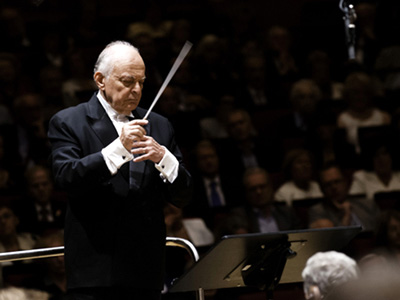by Sedgwick Clark
A Blu-ray video of Lawrence of Arabia was finally released in November. Collectors have been screaming for it for years, but Columbia Pictures was working on yet another upgrade of this foremost of epic films for its “50th Anniversary Edition.” I ran to Barnes & Noble the first day of its availability (somebody’s got to rearrange those deck chairs before the ship sinks), rushed home, and sat starry-eyed and golden-eared for nearly three and a half hours as director David Lean’s breathtaking desert vistas, Maurice Jarre’s magnificent symphonic score, and Peter O’Toole’s astonishing performance (not to speak of the superb supporting actors) set my pulse racing once again.
The range of color on the Blu-ray disc is eye-poppingly rich. I showed it to two film-loving friends the other day, and they were stunned. Still, a lot of work went into making Lawrence what it is today. After its premiere the film was subjected to insensitive cuts over the years. The original parts were badly stored. The soundtracks were destroyed in 1975, so even though Jarre’s music sounds superior to the tinny reproduction on previous video releases, it is reproduced from a fifth-generation dub. The credit sequence of Lawrence filling the gas tank for his fatal motorcycle accident is crisp and clear, but the opening scene of his ride through the countryside and the crash is from an inferior source, with oversaturated color. Fortunately, the excellent quality returns in the following scene of Lawrence’s funeral and remains so throughout.
Those who like to read about films should seek out a 20-year-old book entitled Lawrence of Arabia: The 30th Anniversary Pictorial History (Anchor, 1992) by L. Robert Morris and Lawrence Raskin. The story of the enigmatic T. E. Lawrence and his famous account of the c. World War I Arab revolt, The Seven Pillars of Wisdom, is briefly recounted before moving on to the making of Lean’s epic film itself, its profit-driven abridgement, and its heroic restoration in 1987-88. I bought the book soon after its publication, probably looked at the fabulous array of photos, and returned to my first Musical America Directory deadline. Now, encouraged by screening the Blu-ray, I figured it was time to actually read it and found it riveting.
I was 14 when I first saw the film — three times at Muncie’s Rivoli Theater — and it undoubtedly reinforced my career aspiration of being a film critic in New York. But it was not to be: A college roommate introduced me to Stravinsky’s stereo recording of The Rite of Spring, and my life goal shifted to a different branch of the arts. That certainly hasn’t stopped me from seeing Lawrence every chance I could on a big screen, however, including the 1971 reissue at New York’s legendary Rivoli Theatre on Broadway across from Jack Dempsey’s bar between 49th and 50th, both long gone now. This showing of Lawrence was drastically altered, having had 35 minutes sliced from the 222-minute 1962 premiere to allow more showings per day in theaters. Moreover, when the film was shown on television, further bits and pieces of various lengths were cut by Columbia studio technicians to allow for commercials, and crucial original parts became lost or misplaced – or, in the case of the soundtracks, simply junked.
Enter film archivist and restoration expert Robert A. Harris, who knew the stature of Lawrence and that it would essentially be a “lost” film if someone didn’t act fast. Columbia execs were enthusiastic, and in January 1987 Harris began the arduous job of locating the original parts and assembling the premiere version of the film. Fortunately, he had the invaluable assistance of the original editor, Anne Coates, and director Lean. It is this restored “Director’s Cut,” with small trims in the film that Lean had wanted to make soon after the film’s release, that we see on the Criterion Collection laserdisc, the 2002 DVD, the subsequent “Superbit” DVD, and the new HD Blu-ray at hand. The feature length is now approximately 217 minutes, with a grand total of 227 minutes including the Overture, Entr’acte, and Exit Music.
Lawrence of Arabia is inconceivable without Maurice Jarre’s score. The grand romantic sweep of his Lawrence theme, the brutal rhythms of the entrance into Auda abu Tayi’s camp, and the stodgy British march music are subtly varied throughout to match the emotional tenor of the scene at hand. At the end of the Overture, Jarre even has the three themes played in counterpoint – not a compositional trick often encountered in “movie music.” My guess is that Dutch composer Gerard Schurmann’s orchestrations are a strong contributing factor to the success of this score. Jarre’s personal use of percussion and exotic instrumentation are always prominent, but there is also a transparency of texture that doesn’t exist in Jarre’s thickly scored music for Lean’s Doctor Zhivago.
The Lawrence score could have been a disaster. Producer Sam Spiegel’s first choice was for Sir William Walton (who scored Olivier’s Henry V, Hamlet, and Richard III) to write the patriotic British music; Sir Malcolm Arnold (Oscar winner for Spiegel-Lean’s previous film, The Bridge on the River Kwai) would score the dramatic scenes and conduct. But the British composers hated the film and pulled out. Spiegel next called on Benjamin Britten to write the British music, Aram Khachaturian the Arab scenes, and the young French composer Maurice Jarre, who had just finished scoring Sundays and Cybele, to score the dramatic scenes. But Britten was too busy, and the Armenian composer couldn’t leave the Soviet Union. At some point, Bernard Herrmann was approached, but he demanded too much money. So it looked as if Jarre alone would compose the music.
But Spiegel had another brainstorm: He signed up Richard Rodgers to read the script and, without seeing the film, compose themes that Jarre could orchestrate. When Lean heard the American theater composer’s themes played on piano, he erupted (“Sam, what is this rubbish? This is ridiculous!”). Spiegel then asked Jarre if he had composed anything that Lean could hear; he had, and he played his Lawrence theme for Lean, who enthused, “Great! That’s exactly what I want! Sam, that’s what we should have — this kind of feeling.” At this point, Jarre had just five weeks to score a 222-minute film, which he did superbly, winning one of the film’s seven Oscars.
There’s more to this improbable tale. The London Philharmonic had been hired to perform the score, with the orchestra’s music director, Sir Adrian Boult, conducting. Jarre rehearsed the musicians for three hours prior to the recording sessions and then turned the podium over to Boult. But when Sir Adrian realized he would have to synchronize the music to the film, which he had never done before, he declined to conduct and the composer led the sessions. And yet, although he didn’t lead a note of the score, it is Boult’s name credited on the titles because Spiegel wanted more British names associated with the film! At least Jarre received proper credit (and royalties) for the soundtrack album.
The New York Philharmonic announced its 2013-14 season last week. It’s beginning its new season with two programs of films accompanied live by the orchestra. The first program (September 17 and 18), conducted by Constantine Kitsopoulos, consists of excerpts from Hitchcock films. The second (20th and 21st), conducted by Alan Gilbert, will be the complete Stanley Kubrick 2001: A Space Odyssey. (In Cinerama?) Let’s hope the film quality is superior to that on a Philharmonic program conducted some years ago by John Williams. And then we can hope for a big-screen presentation of Lawrence of Arabia.
Looking Forward
My week’s scheduled concerts (8:00 p.m. unless otherwise noted):
2/4 at 6:00. Zankel Hall. Making Music: Osvaldo Golijov. Jeremy Geffen (moderator). Lawrence String Quartet; Jessica Revira, Biella da Costa, sopranos; The Zankel Band. Golijov: Qohelet (string quartet). Ayre (song cycle).
2/5 Carnegie Hall. Daniil Trifonov, piano. Scriabin: Sonata No. 2, Op. 19. Liszt: Sonata in B minor. Chopin: 24 Preludes, Op. 28.

